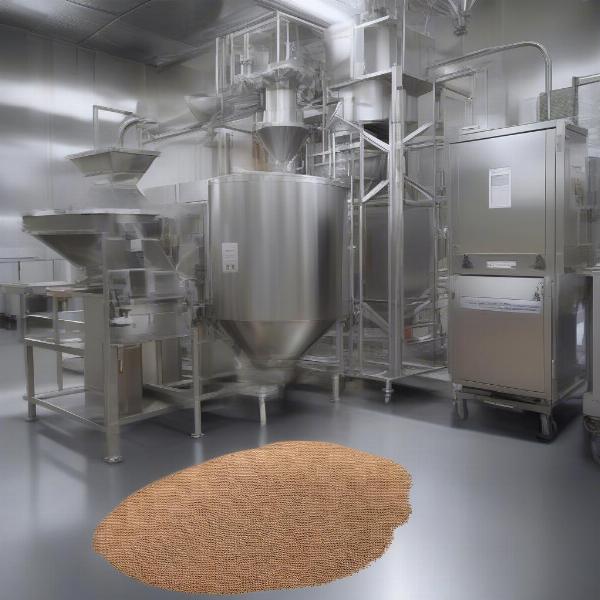The Great Canadian Dog Food has become a popular choice for many dog owners, but navigating the various options and understanding what truly constitutes “great” can be challenging. This comprehensive guide explores the world of Canadian dog food, from understanding ingredient sourcing and manufacturing processes to navigating marketing claims and choosing the best diet for your canine companion. We’ll delve into the nuances of different formulations, address common concerns, and empower you to make informed decisions about your dog’s nutrition.
Decoding “The Great Canadian Dog Food”: What Does it Really Mean?
What qualities elevate dog food to the status of “great”? While marketing can be persuasive, true greatness lies in the nutritional value, ingredient quality, and suitability for your individual dog’s needs. Canadian dog food often boasts locally sourced ingredients, strict manufacturing regulations, and a focus on sustainability. However, not all Canadian dog food is created equal. This section will help you decipher labels, identify key ingredients, and understand what to look for (and what to avoid) when selecting a great Canadian dog food.
Understanding ingredient lists is crucial. Look for whole meat sources listed as the first ingredient, followed by recognizable vegetables, fruits, and healthy grains. Avoid artificial colors, flavors, and preservatives. Prioritize brands that are transparent about their sourcing and manufacturing processes.
Navigating the Canadian Dog Food Market: Brands and Formulations
The Canadian dog food market offers a wide range of brands and formulations, catering to various dietary needs and budgets. From premium brands prioritizing locally sourced ingredients to more economical options, the choices can be overwhelming. This section will explore some popular Canadian dog food brands and discuss the pros and cons of different formulations, including kibble, canned food, raw diets, and freeze-dried options.
Consider your dog’s age, breed, activity level, and any specific dietary requirements when choosing a food. Puppies require different nutrient profiles compared to senior dogs. Active breeds benefit from higher protein and fat content, while some dogs may require specialized formulas for allergies or sensitivities.
Beyond the Label: Ensuring Quality and Safety
While labels provide valuable information, ensuring the quality and safety of your chosen dog food goes beyond simply reading the ingredient list. Look for brands that adhere to strict quality control measures, conduct regular testing, and are transparent about their sourcing practices. This section will discuss the importance of certifications, such as AAFCO compliance, and highlight the benefits of choosing brands committed to sustainability and ethical sourcing.
 Canadian Dog Food Quality Control
Canadian Dog Food Quality Control
Choosing a great Canadian dog food involves careful consideration of various factors. From understanding ingredient quality and manufacturing processes to considering your dog’s individual needs, informed decisions are essential for your dog’s health and well-being.
Conclusion
Finding the great Canadian dog food that perfectly suits your dog’s needs requires research, careful consideration, and a commitment to prioritizing their nutritional well-being. By understanding the nuances of ingredient lists, navigating the Canadian market, and prioritizing quality and safety, you can ensure your canine companion thrives on a diet tailored to their individual needs.
FAQ
- What are some common Canadian dog food ingredients? Many Canadian dog foods utilize locally sourced ingredients like salmon, beef, poultry, grains, and vegetables.
- Is Canadian dog food generally more expensive? Pricing varies depending on the brand and ingredients. While some premium brands are more expensive, there are also affordable Canadian options available.
- How can I tell if a Canadian dog food is high quality? Look for whole meat sources as the first ingredient, avoid artificial additives, and prioritize brands transparent about their sourcing and manufacturing.
- What should I do if my dog has allergies? Consult your veterinarian for recommendations on hypoallergenic Canadian dog food options.
- Are grain-free diets always better? Not necessarily. Some dogs thrive on grain-inclusive diets, while others may benefit from grain-free options. Consult your vet for guidance.
- Where can I find more information about specific Canadian dog food brands? Check the brand websites, read online reviews, and consult your veterinarian for personalized recommendations.
- How often should I switch my dog’s food? Avoid frequent switching unless necessary due to allergies or other health concerns. Gradual transitions are recommended when changing food.
Internal Links:
- Learn about travelling with your dog: best economical rv for travel with dogs in canada
- Find dog-friendly accommodations: dog friendly hotels banff alberta
- Discover more about Huskies: husky dog breeders ontario
- Explore dog treat options: cod skin dog treats
About ILM Dog
ILM Dog is your trusted international resource for expert dog care and breed information. We offer comprehensive guidance on dog breeds, health, training, nutrition, grooming, and accessories, empowering you to provide the best possible care for your canine companion. From choosing the right breed to understanding their nutritional needs, ILM Dog is your one-stop shop for all things dog-related. Contact us at [email protected] or +44 20-3965-8624 for expert advice.